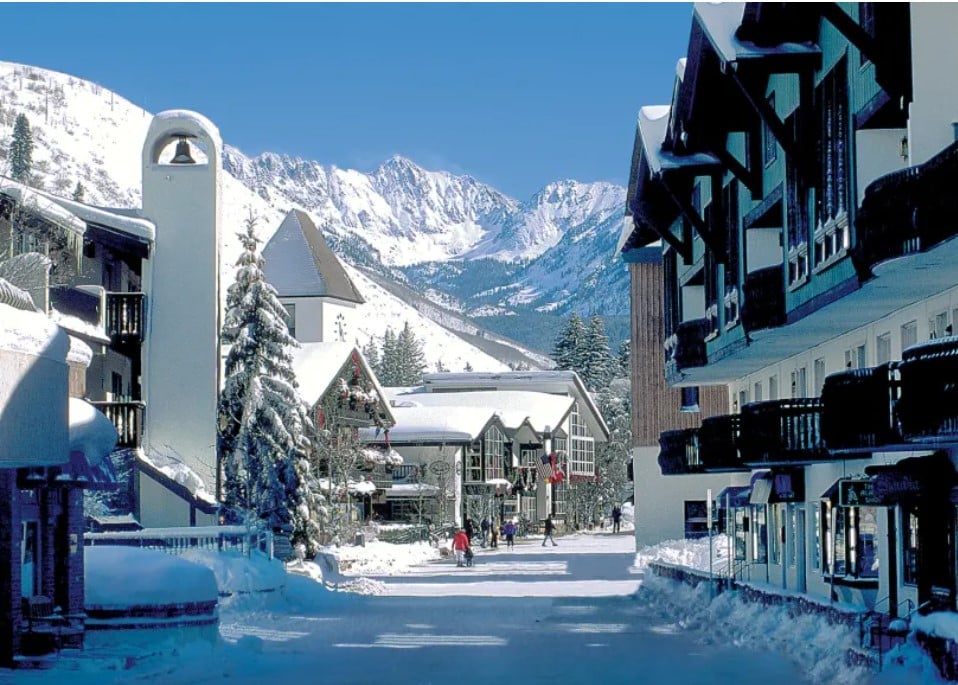
The alpine architecture of Vail Village is apparent on a snowy day. (The Denver Post/Gasthof Gramshammer)
A federal judge has blocked the Town of Vail from enforcing its ban on FedEx and UPS trucks in two pedestrian areas after determining that ban likely violates federal law.
On Friday, U.S. District Judge Charlotte Sweeney granted a request by the Colorado Motor Carriers Association to lift the ban until a trial can be held on the CMCA’s lawsuit against Vail. Sweeney said the ban is “reasonably likely to be found constitutionally infirm” at trial.
“No one on behalf of the town has explained why it is unacceptably risky for high-volume commercial carrier trucks to operate in the pedestrian mall areas,” the judge wrote in her 28-page decision, “while other motor vehicles of similar types and sizes — such as public transportation buses, armored money vehicles, and waste and recycling collection trucks — do not pose such risks and remain free to drive through those areas.”
An attorney for Vail, Josh Marks at Berg Hill Greenleaf Ruscitti, declined to comment on the decision. Attorneys for the CMCA didn’t respond to requests for comment.
In August 2022, Vail passed an ordinance prohibiting delivery trucks from entering Vail Village and Lionshead Village, to make the areas friendlier to skiers and pedestrians. Those areas are mostly off-limits to cars, with exceptions for people leaving parking garages.
Rather than deliver directly to businesses and residences, truckers must now drop their cargo at loading docks. Couriers in small electric vehicles then take the goods to their destinations. The program takes 47 trucks off village streets during an average winter day, Vail says.
The ordinance initially made an exception for big commercial carriers, such as FedEx, UPS and the U.S. Postal Service. But in August, Vail began cracking down on them as well. So, on Oct. 20, the Colorado Motor Carriers Association sued to stop that crackdown.
Sweeney’s decision temporarily blocks the ban while the case moves ahead. She says that the order was necessary to prevent “irreparable harm” to truckers and their clients.
“The ordinance’s enforcement so far has already resulted in multiple deliveries of commercial goods to customers within the pedestrian mall areas being delayed, left unattended, or simply undelivered,” Sweeney wrote in last week’s order.
More ominous for the Town of Vail, Sweeney wrote that she is likely to side with the trucking group in the overarching case too. She agrees with the CMCA that Vail’s ban is probably preempted by two federal laws governing trucking and therefore unconstitutional.
Both federal laws have exemptions in cases where public safety is at risk. But, using the words of Vail’s leaders against them, Sweeney determined that the town’s ban on delivery trucks was primarily designed to preserve mountain aesthetics, not ensure the public is safer.
Twice in her order the judge noted that FedEx and UPS drivers have “never been cited for traffic violations in the pedestrian mall areas” and never “injured a pedestrian in the pedestrian mall areas.” For that reason, Sweeney found it unfair that other large trucks are still allowed in the areas, including those driven by the town’s approved courier, 106West Logistics.
“No one on behalf of the town has endeavored to explain why pedestrians in the pedestrian mall areas are safer around motor vehicles operated by 106West Logistics than they are around identical vehicles operated by other commercial carriers,” the judge wrote.
The Town of Vail won a small victory when Sweeney declined to end the entire ban on delivery trucks. Instead, only the amended ordinance from this summer that expanded the ban to the largest carriers, such as FedEx and UPS, has been lifted.
The CMCA is represented by a trio of lawyers from the Indianapolis firm Scopelitis Garvin Light Hanson & Ferry, plus Sterling LeBoeuf at Davis Graham & Stubbs in Denver.
Vail’s lawyers are Marks and David Goldfarb with Berg Hill Greenleaf Ruscitti in Boulder.
